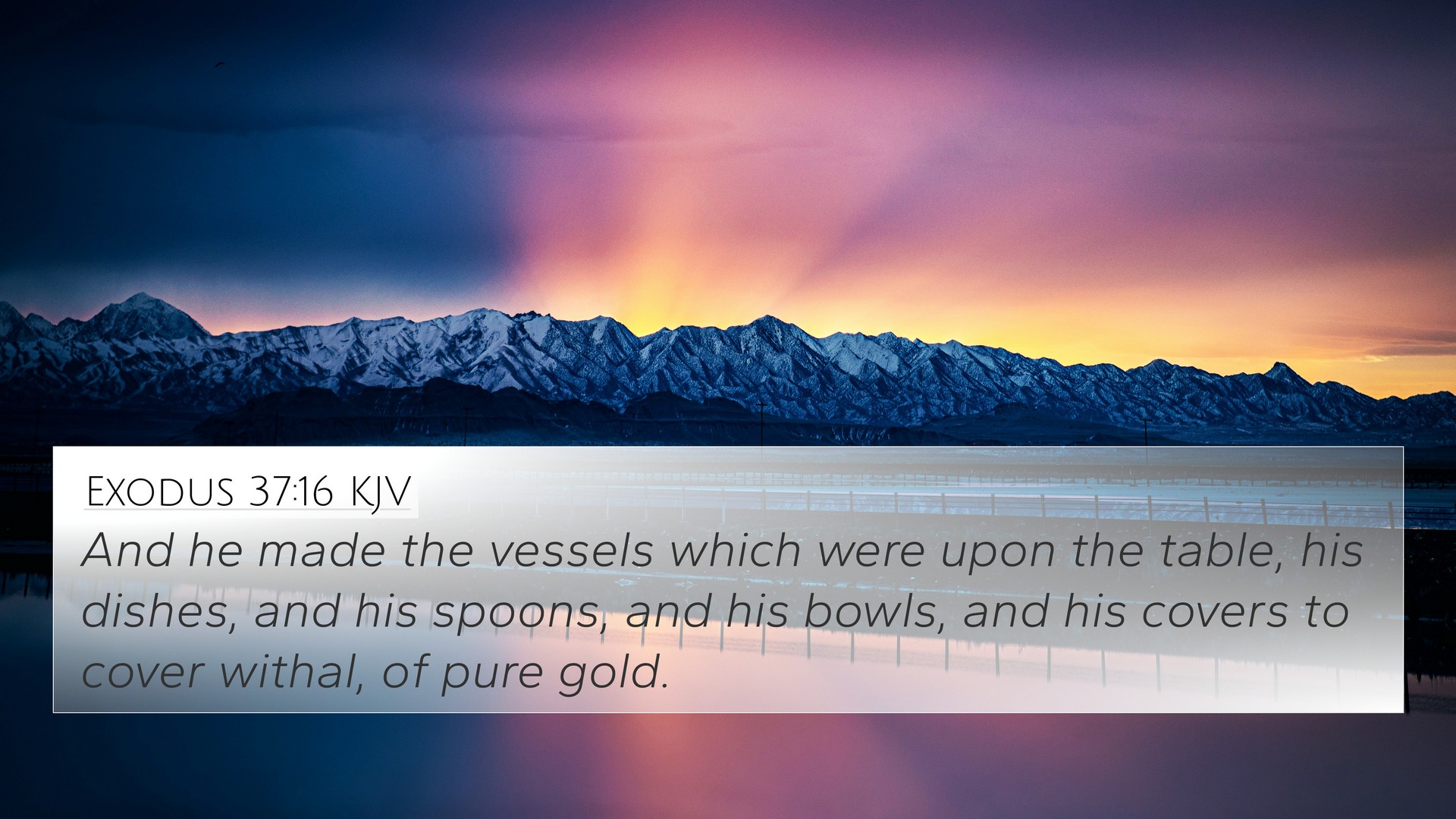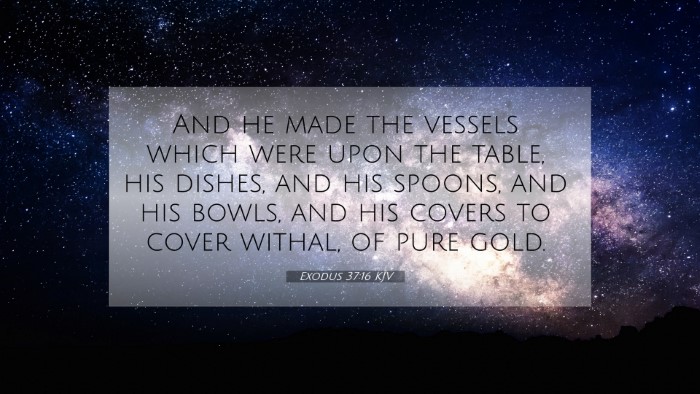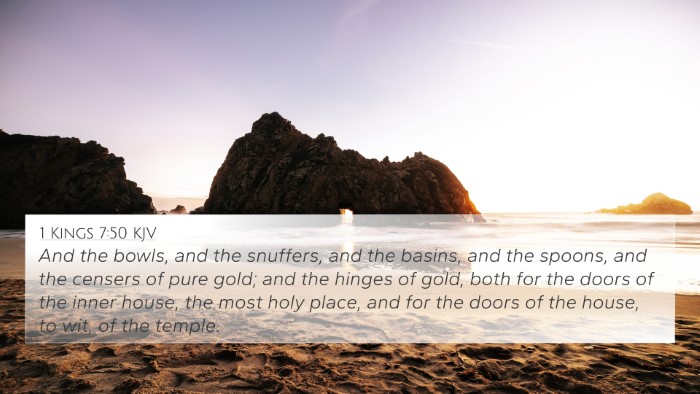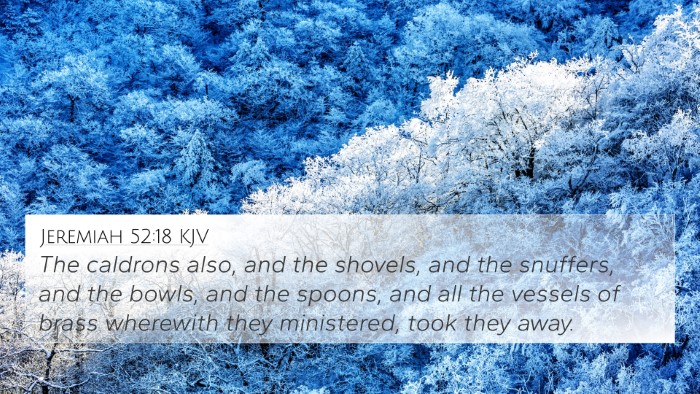Understanding Exodus 37:16: A Comprehensive Analysis
Exodus 37:16 reads: “And he made the vessels which were upon the table, his dishes, and his spoons, and his bowls, and his covers to cover withal, of pure gold.” This verse encapsulates the meticulous attention to detail that was a hallmark of the construction of the Tabernacle and its furnishings.
Introduction to the Verse Meaning
The verse describes the creation of specific vessels used in the service of the Lord's table within the Tabernacle. This detail reflects an overarching theme in the Scriptures about the importance of holiness and beauty in worship. Through the insights of public domain commentaries, we will explore the implications, connections, and the significance of Exodus 37:16.
Commentary Insights
Matthew Henry's Commentary
Henry notes that this text emphasizes the careful and dedicated craftsmanship by Bezalel, who led the construction. The golden vessels symbolize purity and the divine nature of God’s covenant with His people. The specificity in detail serves to remind worshippers of the importance of approaching God with reverence.
Albert Barnes' Notes
Barnes expands on the notion that the vessels were not only functional but also highly ornamental, representing the glory of God. The use of pure gold signifies the purity of intentions behind worship. Barnes emphasizes that these materials were meant to reflect the holiness of the spaces in which they were used.
Adam Clarke’s Commentary
Clarke provides additional insight into the form and function of the items mentioned—dishes, spoons, bowls, and covers. He explains that these items had both practical use and ceremonial importance, underscoring the notion that all aspects of worship should be executed with excellence.
Biblical Cross-References
To understand Exodus 37:16 more fully, consider the following cross-references:
- Exodus 25:29 - Details about the design and materials of the table’s utensils.
- 1 Chronicles 28:12 - Reference to King David providing plans for worship materials.
- Hebrews 9:2 - Relates to the significance of the Tabernacle and its furnishings.
- 2 Chronicles 4:8 - Discusses the vessels used in the temple service.
- Hebrews 9:11 - Christ as the ultimate fulfillment of the sanctuary and its offerings.
- 1 Peter 2:5 - Believers as living stones, emphasizing the importance of holy worship.
- Philippians 4:18 - Referring to the offerings made to God, paralleling the concept of giving to God in worship.
Thematic Connections
The construction of the Tabernacle and its utensils illustrates several enduring themes in biblical theology:
- Holiness: The items were made of pure gold, signifying God's holiness and the expectation of holiness in worship.
- Excellence in Worship: The attention to detail reflects the importance of excellence and reverence in worship practices.
- God's Presence Among His People: The Tabernacle served as a central point for God to dwell among His people.
Practical Application
This verse, as part of the broader narrative, encourages believers today to offer their best to God in both material and spiritual worship. It highlights that all acts of worship should reflect God's glory and be conducted with reverence and excellence.
Conclusion
Exodus 37:16 serves as a reminder of the beauty, purity, and holiness expected in the worship of God. By utilizing biblical cross-references and understanding the thematic connections within Scripture, believers can deepen their appreciation for such passages. This verse encourages self-examination regarding how we present ourselves and our resources in service to God.
Resources for Further Study
- Bible Concordance: A tool to find keywords and themes across the Bible.
- Cross-Reference Bible Study: Exploring connections between verses for deeper understanding.
- Bible Cross-Reference Guide: A structured approach to identifying and studying related scriptures.
- Bible Reference Resources: Materials to assist in understanding and teaching biblical texts.
In conclusion, Exodus 37:16 forms a critical piece of the narrative surrounding the Tabernacle, and through careful study and cross-referencing, we can gain deeper insights into the nature of God, worship, and our relationship with Him.







